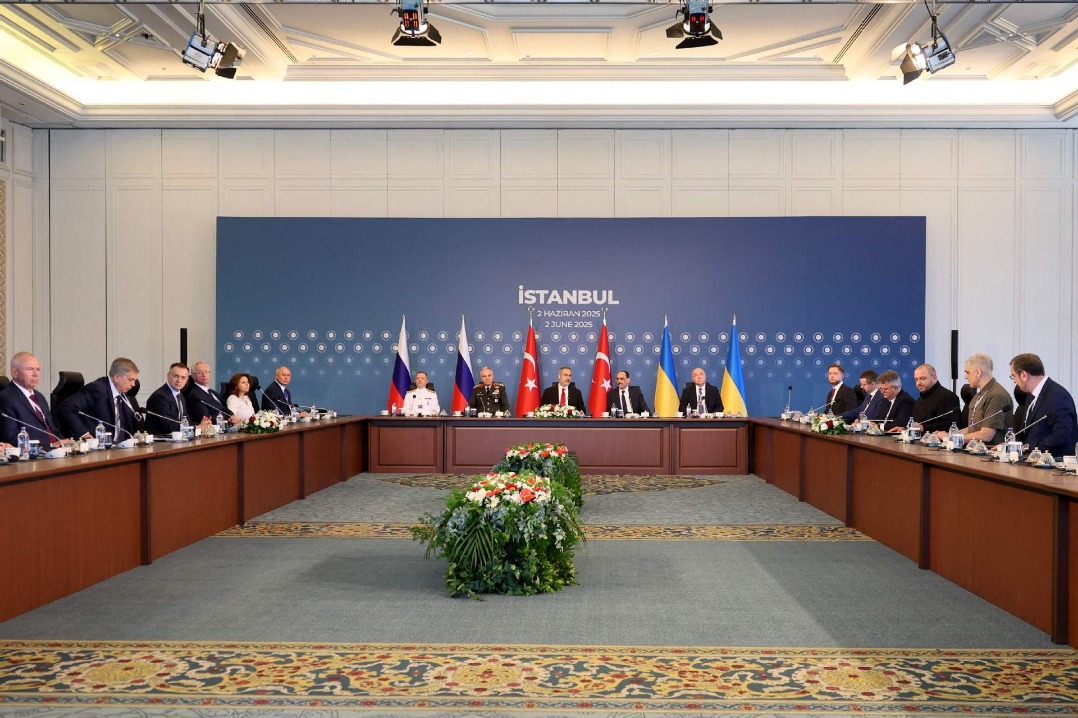Provocative rhetoric of US criticized
China, Asia-Pacific countries choose cooperation, talks over confrontation

China strongly criticized on Sunday the speech delivered by the United States defense chief at the Shangri-La Dialogue in Singapore, calling it an attempt to promote bloc confrontation and exaggerate the "China threat" theory, while experts noted that the US' bid to drive a wedge between China and other countries in the Asia-Pacific region will be ineffective.
US Defense Secretary Pete Hegseth ignored the call for peace and development by countries in the region, peddled Cold War mentality, and smeared and attacked China with provocative and divisive rhetoric, the Ministry of Foreign Affairs said in a statement on Sunday.
China expresses strong dissatisfaction with and firm opposition to this development, and has lodged stern representations with the US, the statement added.
On Saturday, Hegseth delivered a speech at the high-level security summit, urging Asia-Pacific countries to increase their military spending to 5 percent of GDP to counter perceived threats from China in the region, including in the South China Sea and the Taiwan Strait.
The Foreign Ministry responded by emphasizing that the US is the biggest factor undermining peace and stability in the Asia-Pacific region.
"To perpetuate its hegemony and advance its so-called 'Indo-Pacific strategy', the US has deployed offensive weaponry in the South China Sea and has kept stoking flames and creating tensions in the Asia-Pacific," the ministry said in the statement.
These acts are turning the region into a powder keg and making countries in the region deeply concerned, it said.
The statement also reiterated that the Taiwan question is purely China's internal affair, and no foreign country has the right to interfere. "The US should not attempt to use the Taiwan question as a bargaining chip to contain China and should refrain from playing with fire," it said.
The Foreign Ministry noted that there has never been any problem with regard to freedom of navigation and overflight in the South China Sea.
"China has always insisted on resolving disputes through dialogue and consultation with relevant countries and upholding territorial sovereignty and maritime rights and interests in accordance with the law," the statement said.
The Ministry of National Defense also expressed strong dissatisfaction with and firm opposition to Hegseth's speech.
Zhang Xiaogang, a spokesman for the Defense Ministry, said in a statement on Sunday that the US is accustomed to using the Shangri-La Dialogue to create disputes, incite confrontation and seek its own interests.
The US defense chief's remarks were rife with deeply ingrained hegemonic logic and Cold War mentality, Zhang noted.
"For its own selfish interests, the US launches tariff wars and trade wars, forms small circles and engages in bloc confrontation, causing deep concerns among countries. It also strengthens military deployments in the Asia-Pacific, rudely interferes in the internal affairs of other countries and triggers tensions," Zhang said.
The US, by going against the trend and acting willfully, will ultimately harm itself, he added.
Hu Gangfeng, head of the delegation from the National Defense University of the People's Liberation Army to the Shangri-La Dialogue, called "baseless" the allegations made against China by certain countries including the US. These are intended to incite confrontation and destabilize the Asia-Pacific region, he said.
Security challenges
Hu, who is also vice-president of the PLA's National Defense University, warned in his speech at a special session on Saturday that the maritime security in the Asia-Pacific faces severe challenges.
"Certain countries are recklessly pushing for exclusive and confrontational blocs, significantly increasing their military presence, and frequently infringing on other countries' territorial sovereignty and maritime rights under the pretext of so-called freedom of navigation," he said.
Hu highlighted that China has consistently emphasized common security and the proper resolution of disputes and conflicts.
"China respects the centrality of the Association of Southeast Asian Nations and addresses disputes regarding territorial sovereignty and maritime rights through negotiation and consultation," he said.
Hours after the US defense chief's remarks, Anwar Ibrahim, prime minister of Malaysia, the ASEAN chair for 2025, warned in his speech of the dangers of bloc confrontation, emphasizing that the South China Sea issue needs to be resolved through dialogue, rather than confrontation.
"When major powers attempt to divide the world into exclusive zones of control, smaller nations are often left voiceless," he said. "Malaysia does not believe in spheres of influence. Stability does not come from carving up the map, but from creating space for all to participate meaningfully in shaping the global order we live in."
Anwar said the South China Sea issue "is best pursued through steady, principled diplomacy — quiet, when necessary, but always firm".
He added: "We have no interest in seeing tensions spiral into confrontation. ... We will urge restraint, encourage dialogue, and aim to preserve the stability on which this region depends."
Wang Dong, a professor at Peking University's School of International Studies, said that Anwar's speech represents the voice of most ASEAN countries, which pursue cooperation and development and are willing to develop relations with China.
"Most ASEAN countries strongly resist and oppose the US' bid of coercing and enticing them to pick sides. I think this approach is unpopular," said Wang, who was a member of the Chinese delegation to the security summit.
Hegseth's speech was filled with Cold War mentality, he said. For a long time, the US has violated international norms for its hegemonic interests, continuously interfering in China's internal affairs, and is now further hyping the "China threat" to sow discord between China and ASEAN countries, aiming to contain and restrain China, he added.
Da Wei, director of the Center for International Security and Strategy at Tsinghua University, said the US' attempt to divide China and Asia-Pacific countries will be "ineffective because it lacks persuasiveness".
Da, who was also a delegate, noted that countries in the region already have a good foundation for cooperation and relations with China, and that a few provocative remarks made by the US will not change that.

































